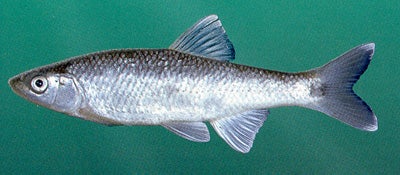BLACKTAIL SHINER
SCIENTIFIC NAME: Cyprinella venusta
CHARACTERISTICS: The blacktail shiner is one of the largest and most common Cyprinella species with a slender body form that is elongate to moderately deep. The head is moderately large, with a sharp snout and a terminal, large, and oblique mouth. A large, distinct spot at the base of the caudal fin is characteristic of this species and is the basis of its common name. Breeding males have an intense steel-blue back and a large, well developed caudal spot. The anal and caudal fins are light yellow, and all fins are edged in white.
ADULT SIZE: Cyprinella venusta occurs from the Rio Grande basin in Texas, east to the Suwanee River, and north through the Mississippi River basin to the confluence of the Ohio River. Two of the three recognized sub-species (Gibbs 1957) occur in Alabama: The slender blacktail shiner, C. v. stigmaturus, is found in the upper Mobile basin (most frequently above the Fall Line), while the eastern blacktail shiner, C. v. cercositgma, occurs in the lower Mobile basin and coastal rivers draining the state. Intergradations between these sub-species has been recognized in the Alabama, Cahaba, and Tallapoosa river systems.
HABITAT AND BIOLOGY: The blacktail shiner is a common and abundant inhabitant of many different aquatic habitats, from headwaters, river channels, and swift riffle-run chutes to slow backwater areas and reservoirs. Our most successful collections of C. venusta have been impoundments, large rivers, and large streams in swift chutes below riffles. Breeding adults more than 4 inches long are regularly captured in Alabama"s rivers in June and July. Spawning occurs from June to August; in June we have observed nuptial behavior over fractured bedrock in Upatoi Creek, Georgia. The diet of this species consists of drifting adult and immature aquatic insects, plant material, and terrestrial insects.
ORIGINAL DESCRIPTION: The blacktail shiner was described by Girard in 1856.
ETYMOLOGY:
Cyprinella means diminutive of Cyprinus, the carp.
Venusta means Venus, referring to the Roman goddess of love.
The copyrighted information above is from Fishes of Alabama and the Mobile Basin.






